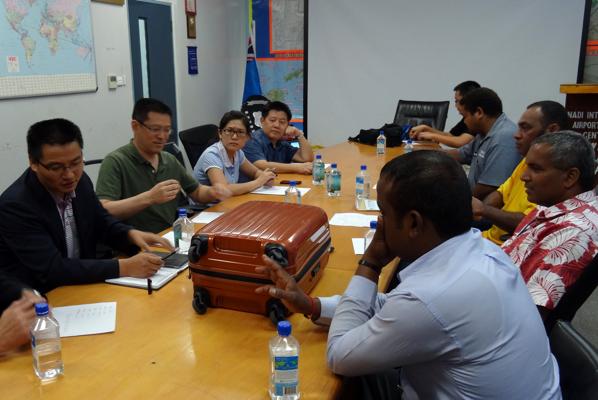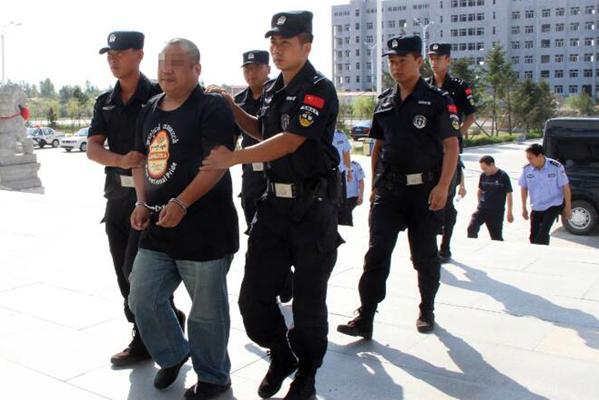Another Chinese ‘fox’ returns home to face consequences of financial scandal
‘I can finally sleep well tonight. I won’t have to worry about where to hide to avoid being arrested,” said Zhu Yujie as he stood on Chinese soil for the first time in 10 years.
The former trading company manager fled the country in 2004 after his role in a $24 million financial scandal was uncovered.
“I feel so sorry for my wife and my weak and elderly parents, but especially for my son,” he said, relating how his fraudulent activities and subsequent flight had resulted in his son being refused entry to the police, despite having graduated from a local police college.
“Only by returning and confessing, will I be able to end my life of crime and start over,” he said, as tears rolled down his face.
Zhu, in his 50s, gray-haired, with bloodshot eyes and heavily lined features, appeared exhausted.
“During years of hiding in Cambodia, life was really tough without stable work or an income,” he said. “The language barrier and cultural differences made it impossible for me to integrate, and I hardly had any contact with my family in China.”
In Cambodia, he used a Guinea- Bissau passport, and moved from town to town to avoid attracting attention.
“I mainly depended on the funds I’d transferred to keep going. I was kidnapped and subjected to extortion by local mafia-like groups. I almost lost my life,” he recalled, adding that his driver was murdered by one of the gangs.
Fraud and forgery
In 2003, when he was working as the manager of a trading company in Taiyuan, Shanxi province, Zhu colluded with staff at a local construction bank branch to misrepresent the rates of return for savers and forge official seals on cash-withdrawal documents. The scam netted the participants a total of 150 million yuan ($24.2 million).
When the fraud was uncovered, Zhu initially fled to Indonesia, before moving on to Thailand, the Philippines and, finally, Cambodia in an attempt to keep one step ahead of the law. The Chinese police notified Interpol, which issued a red notice, or international arrest warrant, for Zhu.
However, worn down by his years on the run, he called the Chinese police in July and pledged to return and confess his crime. He arrived back in China, accompanied by police officers, on Aug 3.
Zhu is one of the 88 so-called economic fugitives who have been repatriated since July, when the Ministry of Public Security initiated a five-month-long operation code named “Fox Hunt 2014” to track down economic fugitives, including lots of corrupt officials who have fled abroad with illegally obtained assets.
As part of the operation, the ministry has sent dozens of special police units to more than 40 countries and regions to apprehend suspects.
“The economic fugitives seem like the crafty foxes who have fled overseas to avoid punishment, but we - the wise hunters - will nail them,” Liu Dong, deputy director of the economic crime investigation department under the Ministry of Public Security, told China Daily in an exclusive interview. “No matter where they are, or who they are, we will catch them,” he said.

Chinese police meet officials in an island nation in the South Pacific to discuss transferring economic fugitives. [Photo/Provided to China Daily]
Flight to ‘safety’
In recent years, a large number of economic fugitives have escaped overseas, transferring huge amounts of illegal assets, and attracting widespread public and media attention, both at home and abroad.
Figures provided by the ministry show that many of the economic fugitives, including many corrupt officials, are still at large, having illegally transferred billions of dollars via money laundering syndicates and underground banks.
Favored destinations include Canada, the US, Australia, some European and Southeast Asian countries, and newer havens such as Fiji and Uganda.
According to Global Financial Integrity, a nonprofit research and advocacy organization based in the US, $2.83 trillion was transferred illegally between 2005 and 2011.
“The hunt for economic fugitives is related to economic security and people’s vital interests,” Liu said. “Our main duty is to catch and repatriate the corrupt officials who are on the run, so they can face trial.”
In January, the central government decided to intensify efforts to capture corrupt officials who have absconded and recover their illegally transferred funds.
In March, the Supreme People’s Procuratorate issued an order to improve the information database on corrupt officials and increase cooperation with the police to target them.
“Apprehending officials who have absconded overseas is essential for fighting graft,” Hong Daode, a law professor from the China University of Political Science and Law, said.
In recent years, a number of corrupt officials have sent their spouses and children abroad to study and invest in businesses. They then transferred funds to foreign bank accounts before applying for tourist visas for themselves and taking the opportunity to slip away, he said.
Since 2012, when China’s new leadership took office, the central government and judiciary have “tightened the supervision of ‘naked officials’, stymied their chances of promotion, and improved efforts to prevent such cases occurring”, Hong said.
Liu Jinguo, vice minister of public security, said the ministry set up special teams for “Fox Hunt 2014”, to collect intelligence, conduct case-by-case studies, and draw up plans for arrest.
“For each individual case, we establish a case file and assign responsibility for it to a special police unit,” he said.
Expanding cooperation
Meanwhile, attention is being paid to expanding channels of international judicial cooperation to improve efficiency in a number of areas, including intelligence, shared investigations, the recovery of funds and joint operations, he said.
Efforts are also being made to persuade fugitives to return home and confess their crimes. Members of the public will be rewarded if they provide relevant information, he added.
According to Liu Dong, in addition to more than 30 fugitives who have been persuaded to return to China, a further 40 have been in contact with the police to discuss returning and confessing their crimes.
“Surrendering is the best choice. We hope more suspects will return soon, and any punishments will be lenient, according to the law,” he said.
“When initiating the capture procedures overseas, the priority is to obtain solid evidence and relevant intelligence,” Liu Dong said. “Police officers should be good at sifting valuable clues from small details.”

A suspect surnamed Duan is repatriated on Aug 30.[Photo/Provided to China Daily]
‘Caught’ by a cat
In May, Lei Ming, from the ministry’s Economic Crimes Investigation Bureau, successfully apprehended a fugitive who was accused of economic fraud and had fled to Thailand. His breakthrough came via a cat in a photograph.
Lei knew the suspect was hiding in Thailand, but was unable to locate the place where he was staying.
He read through the relevant files several times, but found little of value until he carefully inspected a photo of the suspect in which a cat was sitting on a windowsill, gazing at the scene outside.
When he followed the cat’s gaze, Lei saw streetlights, a manhole cover and a pedestrian crossing and remembered seeing exactly the same scene when he had visited a suspected location. Armed with this information, Lei quickly located the suspect’s home and was able to apprehend him with the help of the local police.
Practical difficulties
“The police in China face practical difficulties repatriating fugitives once they’ve escaped overseas, either because China has not signed extradition treaties with countries, such as the US and Canada, or because of lengthy or complex legal procedures,” Liao Jinrong, director of the ministry’s International Cooperation Department, said.
Those factors have resulted in the US and Canada becoming favored destinations for Chinese fugitives.
Liu Dong said that even if the Chinese police do detain fugitives overseas, it does not mean the process of extradition will be easy.
“We should submit solid extradition evidence and documents to the judiciaries of the relevant countries,” he said. “If the evidence is inaccurate or unclear, it will lead to a failure to repatriate suspects.”
Statistics from the Ministry of Foreign Affairs show that China has signed extradition treaties with 40 countries and regions, including Russia, Italy, Spain and South Korea, and has also signed mutual legal assistance treaties with 49 countries and regions, including France, Japan and Thailand.
Liu said that despite several obstacles, improvements in bilateral cooperation on law enforcement between China and the US have been made.
Judicial officials from both sides will meet in August or September every year to discuss major concerns, and the ministry is attempting to set up an annual high-level meeting with the US Department of Homeland Security to exchange intelligence with the view to repatriating criminals and recovering illegal assets, according to Wang Gang, a senior official at the ministry’s International Cooperation Bureau.
Since the special action was initiated, the two sides have established agreements and achieved breakthroughs. “If solid evidence is obtained, the US police will detain suspects and freeze their bank accounts and real estate there.”
Judicial cooperation
In addition, China is strengthening judicial cooperation with a number of other countries, including those in Latin America, Africa, Eastern Europe, as well as Pacific Island nations, to prevent them from becoming new havens for fugitives.
“The key is to set up a preventative mechanism to quickly identify signs of criminality and prevent corrupt officials from fleeing to foreign countries,” Dai Peng, director of the Criminal Investigation Department at the People’s Public Security University of China, said.
“As such, government officers above county level should regularly disclose their individual assets, while at the same time the financial and banking supervisors should diligently perform their duties to uncover suspicious money transfers to corrupt officials’ overseas bank accounts,” he said.
Dai also suggested that China should sign agreements related to the recovery of illegal assets with the relevant countries and push forward laws to curb excessive flows of funds to overseas countries, and to recover as much money as possible if it is moved overseas illegally.